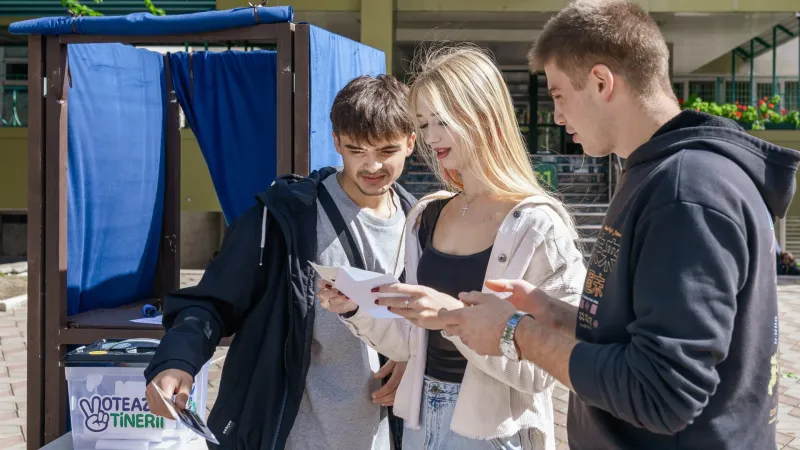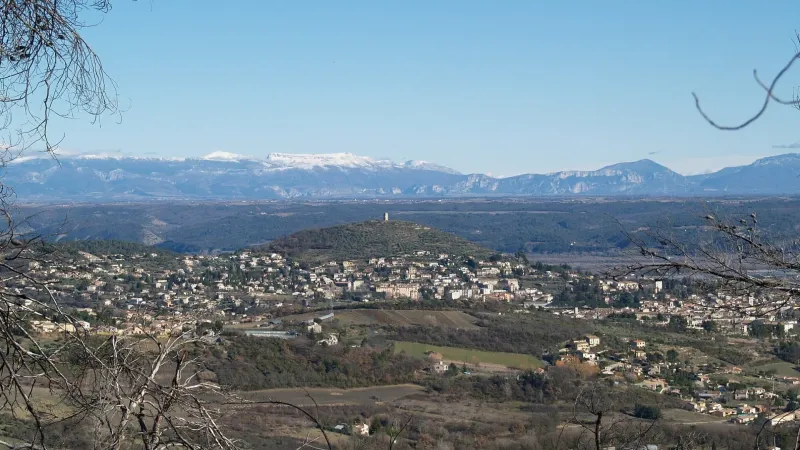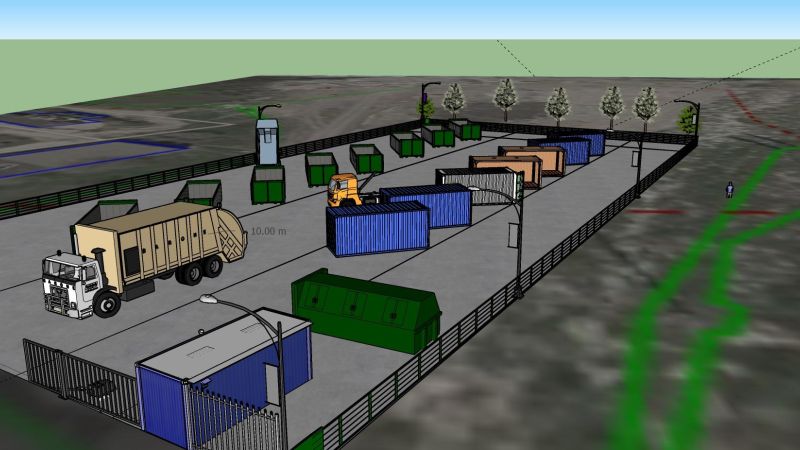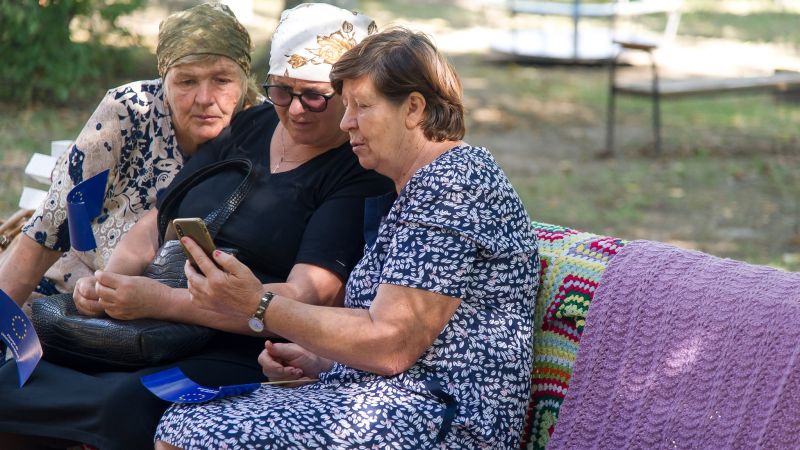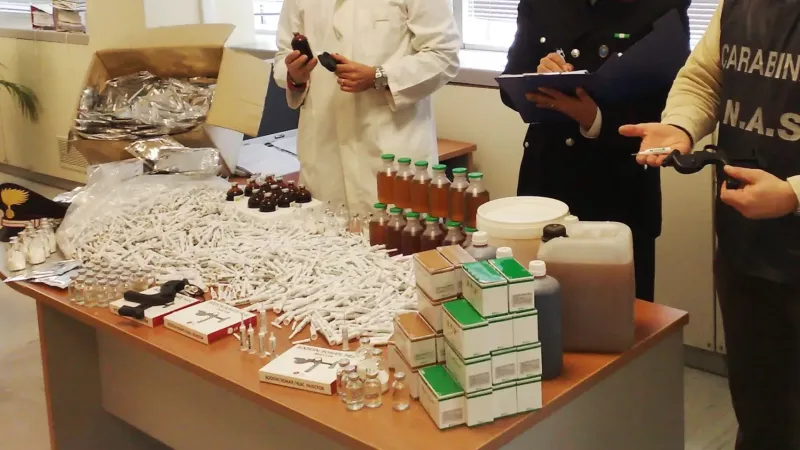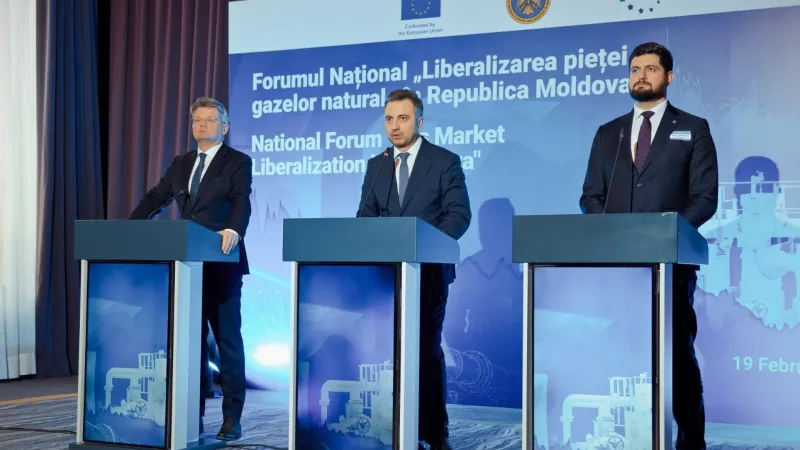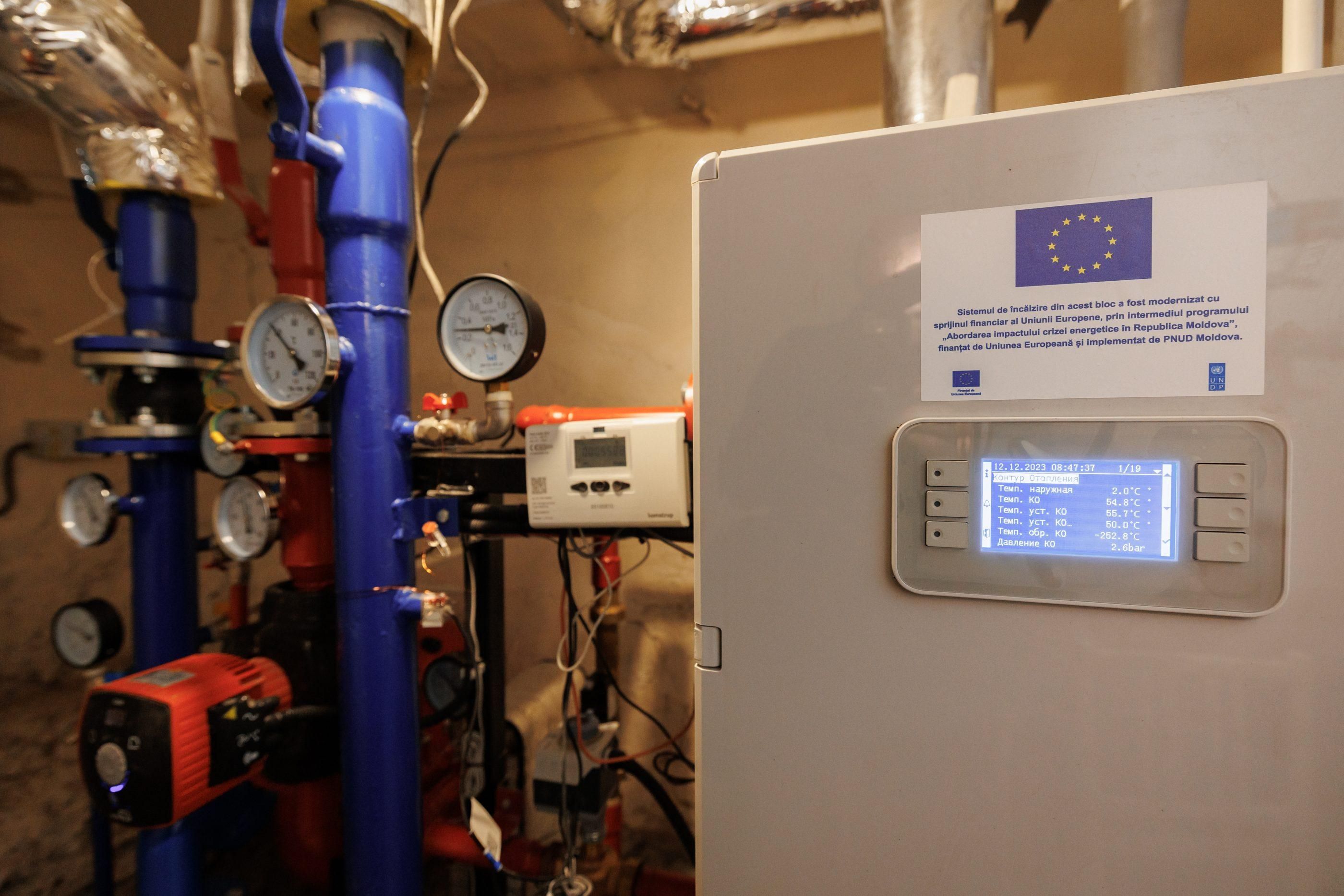
Datorită suportului Uniunii Europene pentru tranziția energetică a Republicii Moldova, locatarii a patru blocuri din Chișinău vor plăti cu până la 30% mai puțin pentru căldură
445 de familii din patru blocuri din Chișinău, Republica Moldova vor plăti cu până la 30% mai puțin pentru căldură, după schimbarea sistemului de distribuție a agentului termic pe unul mai eficient energetic.
Punctele Termice Individuale (PTI) nou instalate permit transferul energiei termice din sistemul centralizat orășenesc în sistemul intern al clădirii, cu pierderi minime de căldură. Datorită acestor modificări, agentul termic va fi încălzit centralizat și distribuit uniform în toate apartamentele pentru încălzire, permițând reglarea și contorizarea individuală a căldurii în fiecare apartament. În plus, PTI va asigura prepararea apei calde menajere. Trecerea la sistemul de distribuție orizontal va aduce beneficii precum economii a energiei, reducerea costurilor facturilor și a emisiilor de gaze cu efect de seră.
Lucrările, în sumă de peste un milion de euro, au fost finanțate de Uniunea Europeană (UE) prin intermediul unui program mai amplu, „Abordarea impactului crizei energetice”, implementat de PNUD Moldova. Blocurile au fost selectate prin concurs deschis, iar locatarii au contribuit cu 20% din valoarea investiției.
Unul din blocurile beneficiare este situat pe strada Bulgară din municipiul Chișinău. De la construcția sa în 1956, locatarii celor 56 de apartamente și-au încălzit locuințele cu lemne de foc, până în anul 1975, când imobilul a fost racordat la sistemul vertical de încălzire centralizat. După aproape 50 de ani de exploatare, sistemul centralizat de distribuție nu mai era eficient, iar odată cu criza energetică din ultimii ani, facturile s-au dublat.
„Cu trei ani în urmă, când am preluat gestionarea blocului, nici nu visam că poate exista finanțare de la UE pentru astfel de lucrări. Procesul a fost cu mult mai ușor decât ne-am gândit și a inclus lucrările în interiorul apartamentelor, instalarea țevilor și radiatoarelor. Chiar și o parte dintre locatarii care se încălzeau cu centrale autonome pe gaz au trecut înapoi la sistemul centralizat. Acum, toți locatarii au apă caldă menajeră la robinet, care lipsea de 30 de ani”, spune administratoarea blocului, Ludmila Rotaru.
Clădirea este pe lista a 25 de blocuri selectate competitiv, la care Agenția pentru Eficiență Energetică va efectua audituri energetice pentru identificarea măsurilor de eficiență energetică care urmează a fi realizate. Aceste audituri sunt finanțate, de asemenea, de către UE prin programul „Abordarea impactului crizei energetice”.
„Majoritatea clădirilor din Republica Moldova, atât rezidențiale, cât și publice, sunt construite înainte de anul 1991, când standardele de eficiență energetică nu erau o prioritate, respectiv au pierderi de căldură foarte mari. De fapt, clădirile sunt responsabile de peste jumătate din consumul de energie din țară, iar Ministerul Energiei pregătește un program investițional masiv în reabilitarea termică a clădirilor, care va reduce pierderile și, respectiv, facturile la energie pentru populație”, a spus Victor Parlicov, Ministrul Energiei.
Sistemul de distribuție orizontal poate fi aplicat în peste 80% dintre blocurile multietajate din țară, conectate la sistemul de încălzire centralizat. Peste 70% dintre blocurile multietajate din Chișinău au performanță energetică redusă, iar pierderile de energie reprezintă până la 50% din consumul total de căldură. Astfel, Agenția pentru Eficiență Energetică urmează a fi transformată în Centrul Național pentru Energie Durabilă, care va gestiona Fondul pentru eficiență energetică în sectorul rezidențial din Moldova. Acesta va finanța un amplu program de schimbare a sistemelor de încălzire și reabilitare a blocurilor de locuit.
„Este îmbucurător să vedem cum Moldova a reușit să facă față reducerilor volumului de gaze rusești și creșterii prețurilor din anii 2021 și 2022, accelerând tranziția energetică și susținând consumatorii vulnerabili, așa cum este și în cazul acestei inițiative-pilot de sporire a eficienței energetice a clădirilor. Sunt mândru că UE, prin Serviciului său pentru instrumente de politică externă, a participat în acest efort. Aceasta și alte inițiative pe care le susținem ajută la reducerea dependenței de aprovizionarea cu gaze rusești și prezintă primii pași către un viitor mai neutru din punct de vedere al emisiilor de carbon”, a declarat Peter M. Wagner, Directorul Serviciului pentru instrumente de politică externă, Comisia Europeană, în timpul vizitei sale la blocul situat pe strada Bulgară.
Anterior, PNUD a mai instalat sisteme de încălzire de tip orizontal în șase blocuri din Chișinău și Bălți, pentru a demonstra eficiența acestor sisteme. Locatarii acelor blocuri au înregistrat anul trecut economii medii la facturi de până la 22% în Chișinău și peste 40% în Bălți.
„Datorită contribuției financiare generoase a UE, ne-am unit eforturile cu Guvernul Republicii Moldova pentru a sprijini gospodăriile vulnerabile energetic la reducerea facturilor la energie, în special în sezonul rece al anului. Am mers mai departe, și în paralel am explorat posibilități de sporire a eficienței energetice, ceea ce este esențial pentru scăderea costurilor la energie și pentru a avea un impact pozitiv asupra climei. Reabilitarea sistemului de încălzire este o măsură practică și concretă, care poate fi replicată la scară mare și care contribuie la accelerarea tranziției către energia verde, de o manieră echitabilă”, a declarat Daniela Gasparikova, Reprezentanta rezidentă PNUD în Republica Moldova.
Sistemul centralizat de încălzire este considerat cel mai eficient, în special dacă funcționează pe bază de cogenerare, adică generează și energie termică, și electrică. În prezent, în Chișinău sunt peste 200 de mii de apartamente amplasate în peste 3800 de blocuri, conectate la sistemul centralizat de încălzire.
Prin programul „Abordarea impactului crizei energetice în Republica Moldova”, cu un buget de 13 milioane de euro, implementat de PNUD, Uniunea Europeană a sprijinit crearea platformei compensatii.gov.md și a lansat o campanie de înlocuire a electrocasnicelor vechi cu unele noi și eficiente energetic. Programul finanțează instalarea de panouri fotovoltaice în case de copii de tip familial și câteva spitale.
În plus, programul prevede sprijin pentru transpunerea celui de-al treilea pachet energetic al UE atât în legislația primară, cât și în cea secundară, precum și transpunerea a o serie de directive și regulamente ale pachetului „Energie curată pentru toți europenii”, care abordează performanța energetică a clădirilor, sursele regenerabile de energie, eficiența energetică, buna guvernare și proiectarea pieței de energie electrică.
